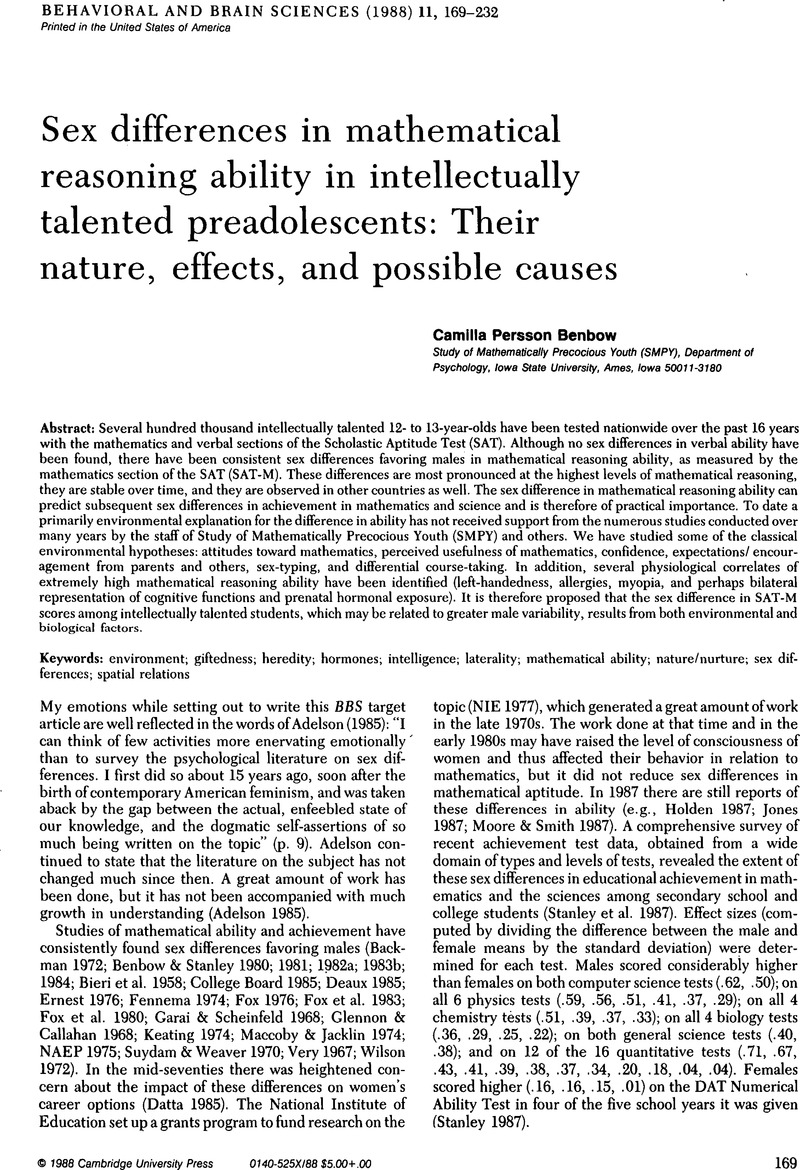Crossref Citations
This article has been cited by the following publications. This list is generated based on data provided by Crossref.
Lubinski, David
and
Humphreys, Lloyd G.
1990.
A broadly based analysis of mathematical giftedness.
Intelligence,
Vol. 14,
Issue. 3,
p.
327.
Lubinski, David
and
Humphreys, Lloyd G.
1992.
Some bodily and medical correlates of mathematical giftedness and commensurate levels of socioeconomic status.
Intelligence,
Vol. 16,
Issue. 1,
p.
99.
Feingold, Alan
1992.
Sex Differences in Variability in Intellectual Abilities: A New Look at an Old Controversy.
Review of Educational Research,
Vol. 62,
Issue. 1,
p.
61.
Thomas, Hoben
1993.
A theory explaining sex differences in high mathematical ability has been around for some time.
Behavioral and Brain Sciences,
Vol. 16,
Issue. 1,
p.
187.
Hedges, Larry V.
and
Friedman, Lynn
1993.
Gender Differences in Variability in Intellectual Abilities: A Reanalysis of Feingold’s Results.
Review of Educational Research,
Vol. 63,
Issue. 1,
p.
94.
Witt, Elizabeth A.
Dunbar, Stephen B.
and
Hoover, H.D.
1994.
A Multivariate Perspective on Sex Differences in Achievement and Later Performance Among Adolescents.
Applied Measurement in Education,
Vol. 7,
Issue. 3,
p.
241.
Stumpf, Heinrich
and
Jackson, Douglas N.
1994.
Gender-related differences in cognitive abilities: Evidence from a medical school admissions testing program.
Personality and Individual Differences,
Vol. 17,
Issue. 3,
p.
335.
Stumpf, Heinrich
1995.
Gender differences in performance on tests of cognitive abilities: Experimental design issues and empirical results.
Learning and Individual Differences,
Vol. 7,
Issue. 4,
p.
275.
Stumpf, Heinrich
and
Eliot, John
1995.
Gender-related differences in spatial ability and the k factor of general spatial ability in a population of academically talented students.
Personality and Individual Differences,
Vol. 19,
Issue. 1,
p.
33.
Sherman, Julia A.
1996.
Spatial visualization and sex-related differences in mathematical problem solving.
Behavioral and Brain Sciences,
Vol. 19,
Issue. 2,
p.
262.
Hammer, Christy
and
Dusek, R. Valentine
1996.
Brain differences, anthropological stories, and educational implications.
Behavioral and Brain Sciences,
Vol. 19,
Issue. 2,
p.
257.
Proudfoot, Diane
1996.
The logic of the sociobiological model Geary-style.
Behavioral and Brain Sciences,
Vol. 19,
Issue. 2,
p.
261.
Dowker, Ann
1996.
How important is spatial ability to mathematics?.
Behavioral and Brain Sciences,
Vol. 19,
Issue. 2,
p.
251.
Foss, Jeffrey
1996.
Arithmetic and old lace.
Behavioral and Brain Sciences,
Vol. 19,
Issue. 2,
p.
252.
Ghiselin, Michael T.
1996.
Differences in male and female cognitive abilities: Sexual selection or division of labor?.
Behavioral and Brain Sciences,
Vol. 19,
Issue. 2,
p.
254.
Chipman, Susan F.
1996.
Still far too sexy a topic.
Behavioral and Brain Sciences,
Vol. 19,
Issue. 2,
p.
248.
Epstein, Herman T.
1996.
Omissions relevant to gender-linked mathematical abilities.
Behavioral and Brain Sciences,
Vol. 19,
Issue. 2,
p.
251.
Wynn, Thomas
Tierson, Forrest
and
Palmer, Craig
1996.
Sex differences and evolutionary by-products.
Behavioral and Brain Sciences,
Vol. 19,
Issue. 2,
p.
265.
Davis, Hank
1996.
Is there a comparative psychology of implicit mathematical knowledge?.
Behavioral and Brain Sciences,
Vol. 19,
Issue. 2,
p.
250.
Gillger, Jeffrey W.
1996.
Sex differences in mathematical abllity: Genes, environment, and evolution.
Behavioral and Brain Sciences,
Vol. 19,
Issue. 2,
p.
255.


